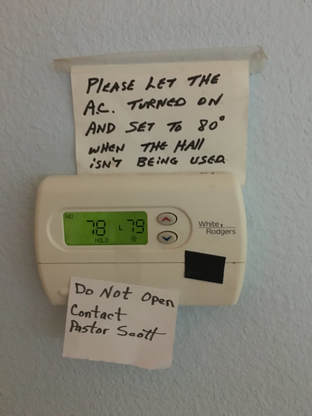 For the last few weeks our church has been going through an interesting crisis, Thermostatgate. We've had a rogue thermostat that keeps changing from cool air to heat at random times, without any explanation. The theories behind it are a short in the circuitry, a saboteur who adjusts it when no one is around, or maybe even Bigfoot. We've put tape on it and a note asking people to contact our office (apparently me, because I regulate the temperature?). There's also been talk about setting up a game camera. No word yet on night patrol, but we are drafting our 2019 Budget so nothing is beyond possible. One of the things that comes up often in leading the local church is that you'll have moments that your seminary training couldn't prepare you for. I'm a huge fan of continuing education and getting prepared in seminary. It's the best years to prepare and learn exegesis, theology, history, hermeneutics, and to develop not only a strong mind but a pastoral heart. But even with all that, you'll find things you could never prepare for. Be Mentored - I love seasoned pastors. There's nothing they haven't seen. They've been through battles and led significant changes and come out on the other side. Even though the way ministry is done has changed significantly over the generations, one thing that remains is that people are people. Whatever you're going through in ministry, someone has seen it before. Don't Be Surprised - You will see, hear, smell, and experience things that you won't believe. I've watched the cops be called at a funeral, been shown surgical scars in the middle of a store, been scammed by a guy who forgot he gave me the same sob story a few months before, and walked in on a catheter being changed out. At no point could I ever think about a lecture or a book that prepared me for that. Roll With It - One thing that I think happens to a lot of us when we finish seminary and we have a freshly printed Masters or Doctorate on the wall is that we're in some sense above things. But you very well as a pastor may be asked to clean a toilet, or to help with a workday (trimming palm trees has been my favorite so far), or find yourself in one day working as a crisis counselor, writer, and plumber. You have to roll with it. One of my previous stops had a staff motto of "Whatever it takes!" Write It Down - I have a pastor friend who will occasionally text me pictures of the unusual things they find in long forgotten corridors of their church. You have to write these things down, if for nothing else than proof it really happened. Laugh with it, because you're in the front seat to some pretty eye opening things. And you never know when something that was never on your job description will be the moment where someone makes a life-altering decision to follow Jesus. And you were there, holding the plunger. What has been your best "I wasn't taught this in seminary" moment?
1 Comment
 Last year we waited anxiously for Hurricane Irma to make landfall, not knowing what the damage would be or how devastating the impact might be to our community. Luckily, the storm moved inland long before it got to the Tampa Bay Area and it was much weaker. But for our church, it was a wake-up call. We recognized we were completely unprotected in the event of a major hurricane. In fact, before the storm, I took some pictures of our facility in case we lost everything in the storm and needed proof for the insurance claim. What we decided to do was purchase and install fabric hurricane shutters. Supposedly it can withstand major impact without damaging the window, but I'm too nervous to try it with a baseball. Hopefully the money we spent to have the shutters made and installed is wasted, that we never have to set them up in the anticipation of a major hurricane. But just in case, we wanted to be protected. We can never assume our ministries and leadership is perfectly safe. We have to make sure that we have protection in place for not only the health of our churches but also our faithfulness to our calling. I want to suggest seven ways to protect your ministry: 1. Be Above Reproach Financially - I'll say this as nicely as I can, if you're a pastor, stay away from money. Don't take people's offerings for them. Don't monkey with the safe. Don't touch cash at the fundraiser dinner. Don't have access to the financial records. Do everything you can to make sure you're not touching church money. It's not yours. It's God's. Yes you should see giving reports, but never the name of the person giving. You should know your church's financial picture by reviewing reports and P&L statements, but you should never be seen taking church money. Turn in your credit card receipts and expense reports on time, accurately, and with full integrity. 2. Don't Steal Other People's Messages - Relevant Magazine surprised social media with a story about a church in Colorado openly advertising they want a pastor who preaches other people's sermons. Here's the thing, if you see what someone else said or read how another pastor or scholar interpreted a passage, you have not only a moral obligation but a professional responsibility to give credit where it's due. Sadly a friend of ours shared about confronting their pastor about lifting entire pages from a book in a sermon, and the pastor and church's response was ¯\_(ツ)_/¯. As a pastor, whenever you stand and teach you are giving the impression that you have adequately prepared, that the time the church has compensated you for has been spent in reflection and study. When we plagiarize, we are not only stealing from the original author but also from our church, and by proxy we're robbing God. Don't think it's a light issue. Give credit. Give a name. If you can't recall the name of who wrote it, Google it. If that doesn't work, simply say that you've read or heard elsewhere. Don't pass off someone else's words as your own. 3. Don't Sacrifice Your Family for Ministry - As a pastor, you have a primary obligation to your family. Your church can find another pastor. You are not irreplaceable there. You are irreplaceable at home. Your kids can't just bring in another Dad. Your wife can't bring in another husband. Protect your family time, not at the expense of your faithful ministry, but because that is your ministry. One lie we buy into often in ministry is that we are the center of everything, so we have to be at every meeting or attend every function. You don't. And you're not. Learn to say no on occasion. Make family meals and your children's activities and ball games a priority. Don't let your kids resent ministry because the church gets your best and they get (barely) leftovers. Don't let your wife feel like the church is your mistress. 4. Be Faithful with your Work Time - Protect your ministry by making sure that you are spending the time you need in order to faithfully fulfill your ministry. You don't need to be a workaholic who is distant and removed at home. But you also can't play golf all the time because you're "on call." I love the idea of scheduling your time so you can budget and block what's needed for sermon prep, counseling, administrative responsibilities, meetings, and other obligations. It helps if you're ever questioned about how your time is spent. It's also a matter of integrity. If you're being paid "full time" in ministry, you're expected to work at least 40 hours. Some seasons will be 60 hour weeks, others will be 40-45. But you can't shirk your work time and then expect volunteers to work a full job and then sacrifice their time at church. It's easy. Write it down on your calendar. Your computer & phone have one. Use it. 5. Protect Your Integrity - A lot of criticism has been levied recently about the "Billy Graham Rule" on how ministry leaders interact with the opposite sex. But it's important to make sure that you're above reproach. At the end of the day, what matters is that you've made sure you've not put yourself in a position where your integrity could be in question. However you do that is between you, your church, and your spouse. But you need to make sure you have protection in place. 6. Do Background Checks - Something far too many churches fail to do is run a basic background check on prospective volunteers. Unfortunately we no longer have the luxury of settling for someone being "known" to volunteer, especially when they have contact with minors. If cost is an issue, Lifeway has a great discount where you can have a strong check done for $10. It's money well spent. Don't let anyone, no matter who, volunteer with minors who hasn't completed a background check. Also, it's possible to search statewide sex offender databases along with the background check. We have a report generated when a sex offender moves into our area, in the event they visit our church so we can ensure our children & youth are safe but also for the offender to have the chance to worship without compromising his probation. 7. Staff Well - The final way to make sure that our ministries and leadership are protected is how we hire and staff our churches. Whether you want to admit it, whatever happens in the church will ultimately end up on your desk or in your face. Hiring the right people is critical, and I have a whole chapter devoted to that in Dream Teams. We have to make sure that we're bringing on board, and keeping on board, the right people in the right positions. Part of staffing well means not only hiring but evaluating, coaching, training, and equipping well. If your staff isn't adequately prepared to do what they have been asked to, that falls back on you. So make sure that you have clear expectations for the staff, that job descriptions are accurate and updated, that accountability measures are in place, that evaluations will not only be expected but welcomed, and that constructive feedback is a good thing. What would you add?  One of the old adages in ministry is that the pastoral task is like a 3 legged milk stool. It's held up by three primary tasks: Preaching, Administration, and Counseling/Pastoral Care. I love this analogy. I've often used it to describe and categorize how we should understand the scope of our calling, identify our strengths & weaknesses, and how to shape a pastoral job description. It works. But just because something "works" doesn't mean that we shouldn't evaluate it. One of the most dangerous phrases in leadership is "if it ain't broke, don't fix it." It's fine on your car, but in a church or organization, just because something works doesn't mean it's healthy or best. Ideas and practices always have a shelf life, and when something cruises because it works we can often overlook our need to evaluate and possibly alter it. That's where I think we are with the milk stool. It's not that Preaching, Administration, and Pastoral Care aren't critical elements of a pastor's calling. They are. But the fourth thing that holds it all together is vision. The three milk stool legs are great. They help us shape our day. But they don't cover a key element, vision. If we're going to faithfully lead the congregations God has placed us in, we can't be content to do the tasks of ministry. We must lead with vision. We must point our people to the place God would have us go. We must chart the course, take the risk, and lead our churches towards what God has.
Vision is the stool itself. Vision holds together our Preaching, our Administrating, and our Pastoral Care. Our Preaching Points to Vision - Whenever we preach, we have the option to do a couple things. One is to faithfully preach the text. We may do it in series. We may do it in topical exposes of whatever is going on in culture. We may do it through one-off messages every week. The second though is to be both faithful to the text and preach it as it was written and capture vision. My desire as a pastor is for our people to be captured by the Gospel, shaped by the Word, have a biblical worldview, love their neighbors and the nations, and fall into worship. When we preach with our vision in mind, towards the place God wants us to go, we're not just telling people what the Bible says, we're pointing them towards a place to go. Our Administration Supports the Vision - If Preaching is the public part of our ministry, Administration is the behind the scenes. This is the skeleton of our pastoral work. And it supports the vision if we seek to align our processes, our budget, our resources, our volunteers, etc. towards the vision. If your church has as its vision "we want to reach young families" but you're not dedicating budget resources, volunteer training, facility space, and staffing towards family ministry, you're not really serious about your vision. Administration is where we take the vision and we seek to align what our church does, what our money goes to, what our staffing looks like, and how we spend our time towards the vision. Our Pastoral Care Reinforces the Vision - Pastoral Care is the time part of our pastoral ministry. And this is where we spend time with people one-on-one or in small groups. We're visiting and ministering toward the sick and hospitalized, we're working through family dysfunction and trauma to see redemption come as a fruit, we're helping walk people through the day-to-day of their Christian life. Pastoral Care reinforces the vision because it reinforces the one bringing the vision. If you're in pastoral ministry, your ability to lead and influence comes through the strength of relationships that you have. And you develop those relationships slowly over time when you're laboring in the trenches with people. If all people see of you is a talking head on Sunday and you don't love them enough to visit them in their distress or hold their hand after their spouse dies, you can't lead them. Pastoral Care is, as Maxwell says, walking slowly through the crowd. Fire away with comments!  We're in a really unique, interesting, fun (depending on the day what word we use) with our dinnertime prayer. Both our boys love to do the prayer, and they each have a very unique way they go about it. Meanwhile Mommy & Daddy are hungry and want to thank God for provision and eat our supper before it gets cold, again. So our 7 year old takes time to thank God for our food, for the day he had, for people in our family, for his friends who aren't in church, and occasionally a request we're able to go to Disney World. The 4 year old will ask God to "help daddy's eye feel better" (I had floaters one night before supper), to "help mommy's face" (still not sure what that's about), and that he can have a roll and dessert. There's also interludes of praying for every piece of food on his plate, for his special little potty, and more. Parents, your prayer time at dinner is an incredible opportunity to be a part of your child's faith formation. Each dinner, each prayer, each awkward request, each time God is thanked for mashed potatoes, is a chance to help shepherd our children's hearts toward Jesus. I loved what my oldest's devotional said "Nothing is too big or too small for us to bring to God." When we get frustrated at what our kids pray for, when we try to hurry them along, when we cut them off and say Amen! before they can finish (Guilty - and don't lie, you've done it before too), we're implicitly showing them and teaching them that there's some things we shouldn't bother God about. But God's not like us. We get frustrated when our kids constantly ask us to watch them, want to tell the same story over and over, or want to give a detailed commentary about the palm trees. We don't like to be bothered. But God does. When we cheer for our kids when they pray about the smallest thing, we're teaching them that God loves them enough that He wants to hear about the mashed potatoes or for daddy's eye to feel better. Another thing we do is that we use the time before dinner to shape our children towards gratitude. Each time we sit down for a meal, even if it's Hamburger Helper, it's a reminder of God's provision for our family. We have the money to buy the groceries. We have the house to live in. We have the table to eat at. We have the gift of family. Is it always what everyone wants to have? Of course not. Your kids may be the same as mine, they could survive and be happy with a steady diet of Goldfish crackers and Chick-Fil-A. But even when it's not something we're thrilled about, we eat it with a grateful heart. Or we at least try it. But finally, dinnertime prayer is an opportunity for us to shape our children's hearts through our own prayers for our kids, namely that they would come to treasure and trust Jesus. So while your children are making their way through the last few things they got in trouble for or what they want for dessert, take time to pray for them to trust Jesus. Pray their heart would love the Word. Pray they would be loved and encouraged by God's people.  Everyone in basketball hates the Warriors. Everyone in football hates the Patriots. Everyone in baseball hates the Yankees. Everyone in college sports hates Alabama, Duke, and Kentucky. The most common reason? "They win all the time." What's lurking below the surface is something more than fandom: resenting success. Think about it. Everyone in college football gets the same number of scholarships. Everyone in the SEC has the facilities, coaches, and fans. But Alabama still wins. Everyone in the NBA gets the same salary cap, draft picks work against good teams, and everyone gets the same TV money and exposure. But the Warriors keep winning. The NFL is designed for parity and punishes successful teams with scheduling. But the Patriots keep winning. Maybe we all have a level of hater to us, where we just get mad and resent when someone else is doing better than us. Maybe it's jealousy because our favorite team languishes behind a more successful rival (I'm a lifelong Louisville fan, the Kentucky success is maddening). But before we put ourselves spiritual and blameless, let's be honest. As pastors, we sometimes find ourselves in the same spot. The church down the road has money to take on a major building project while you're praying the AC units hold out. The pastor on your social media feed who gets a book deal and is speaking at a conference. The megachurch across town is bursting with young families and your median age are Civil War veterans. Pastor, let me encourage you to be content in where God has placed you. He's the one who called you, who sustains you, and who has asked you to be faithful.
Celebrate Others' Success - It's really easy for us to get jealous or resent when someone else's church has a spectacular VBS or has a note-burning ceremony. But whenever great things happen to churches in our community, Jesus wins. It's not about us and our little kingdom, it's about His. So don't resent when others have great moments. Celebrate them. Text that church's pastor and encourage him. We're all in this together. Don't Belittle Others' Failures - The flip side of the coin is for when we have a great moment or a really "successful" ministry to not be a jerk about it. Your church had a youth camp where a lot of kids got saved, and the church across town had to cancel theirs because no one signed up. Don't gloat. Your win today came because of God's grace to you. Work Together - Churches that work together do more ministry than they could do apart from each other. Are you looking at launching a sports ministry? Maybe the church down the road with a big field could be where you host the games? At our church, we're hoping to partner with a neighbor congregation for Upward. They have a gym, we have a big field. We can do more work together than we could do apart from each other. And it doesn't matter who gets the visitors or prospects. Jesus wins, not us. Cultivate a Heart of Gratitude - You may not be on the speaking circuit or have a book deal or pastor a church recognized in denominational news. But you're at a church that hopefully loves you and loves your family. You're at a church that God called you to. You're pastoring people God has called you to love and lead. You're paid to study the Bible, prepare messages, visit and care for people. No matter where God has placed you, you have a lot to be grateful for. And that starts with our hearts. What have you done to celebrate another church's success in your area? |
Scott M. DouglasA blog about leadership and the lasting legacy of family ministry. Archives
August 2023
Categories
All
|
 RSS Feed
RSS Feed



